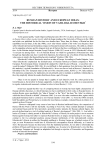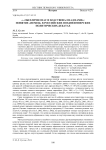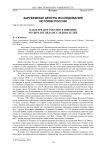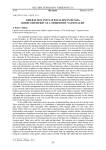Зарубежные центры исследования истории России. Рубрика в журнале - Вестник Пермского университета. История

Russian history and European ideas: the historical vision of Vasilii Kliuchevskii
Статья научная
To the general public, Vasilii Osipovich Kliuchevskii (1841-1911) is above all known for his Course in Russian History (Kurs russkoi istorii), which he began reading at the University of Moscow in the 1880s and which was published for the first time two decades later. 1 Since then, his history of Russia has been republished several times; in the late 1980s, a new nine-volume edition of his works even became a bestseller. Kliuchevskii has had tremendous impact on Russian historical self-awareness. His skills as a historian, his appealing schemes and his eloquent style are all factors that have contributed to his canonical position. As the Russian emigre historian Georgii Fedotov (1886-1951) wrote in 1932, Kliuchevskii''s history "is not just one among many - it is the Russian History on which two generations of Russians have been brought up. Specialists may have voiced their objections, but whenever any of us think of historical Russia, what comes to mind is the Russia Kliuchevskii visualized" (Fedotov 1986: 204). Kliuchevskii''s idea of Russia also involves an idea of Europe. According to Charles Halperin, "even when Kliuchevskii emphasized the distinctiveness of Russian historical evolution compared to West-European, West-European history remained the standard by which the past of Russia - or anywhere else -would be judged" (Halperin 2000: 404). It is not difficult to find quotations from his history that testify to this tendency; a typical formulation of Kliuchevskii is "let us now have a look at Moscow''s location in relationship to the other European states [at the end of the sixteenth century, KJM]" (2: 397, italics added). 2 His numerous comparisons, by implication, do not primarily aim to maintain an antithetic relationship; rather, they implicitly inform the readers that Russia forms a part of Europe.
Бесплатно

Статья научная
В рамках «концептуальной истории» рассматривается понятие «немец» как одно из ключевых в политических дебатах позднеимперского периода в истории России. Это позволяло поднимать вопросы, центральные для интеллектуальной истории России: признание со стороны «значимого Другого» и аутентичность собственной культуры. Аргументируется то, что понятие «немец» конденсировало травматический опыт «непризнания» и, как следствие, позволяло запустить целый ряд реконцептуализаций «немца» - «ложный европеец», «псевдоморф» и в военный период «варвар». В качестве источников использовались преимущественно журналы по религиозно -общественным вопросам, выходившие в начале Первой мировой войны
Бесплатно

Как изучают Россию в Швеции: четыре взгляда исследователей
Статья научная
Предложено четыре интервью с академическими работниками Упсальского центра по изучению России и Евразии. Они позволяют составить представление о становлении славистики в Швеции, о специфике организации и устройства Упсальского центра, о преподавании русского языка в современной Швеции и изучению России в научной среде шведских университетов.
Бесплатно


